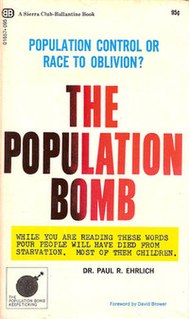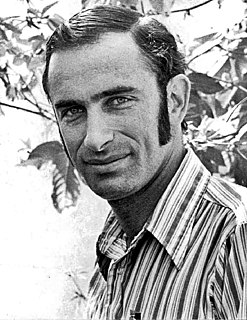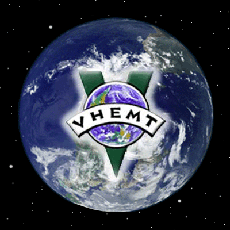
In the United States today, the organized environmental movement is represented by a wide range of organizations sometimes called non-governmental organizations or NGOs. These organizations exist on local, national, and international scales. Environmental NGOs vary widely in political views and in the amount they seek to influence the environmental policy of the United States and other governments. The environmental movement today consists of both large national groups and also many smaller local groups with local concerns. Some resemble the old U.S. conservation movement - whose modern expression is The Nature Conservancy, Audubon Society and National Geographic Society - American organizations with a worldwide influence.
Gaia philosophy is a broadly inclusive term for related concepts that living organisms on a planet will affect the nature of their environment in order to make the environment more suitable for life. This set of hypotheses holds that all organisms on a life-giving planet regulate the biosphere in such a way as to promote its habitability. Gaia concept draws a connection between the survivability of a species and its usefulness to the survival of other species.

The Population Bomb is a best-selling book written by Stanford University Professor Paul R. Ehrlich and his wife, Anne Ehrlich, in 1968. It predicted worldwide famine in the 1970s and 1980s due to overpopulation, as well as other major societal upheavals, and advocated immediate action to limit population growth. Fears of a "population explosion" existed in the 1950s and 1960s, but the book and its author brought the idea to an even wider audience.

Vandana Shiva is an Indian scholar, environmental activist, food sovereignty advocate, and anti-globalization author. Based in Delhi, Shiva has written more than 20 books.

I = (PA)-T is the mathematical notation of a formula put forward to describe the impact of human activity on the environment.

Paul Ralph Ehrlich is an American biologist, best known for his warnings about the consequences of population growth and limited resources. He is the Bing Professor Emeritus of Population Studies of the Department of Biology of Stanford University and President of Stanford's Center for Conservation Biology.

William Ernest McKibben is an American environmentalist, author, and journalist who has written extensively on the impact of global warming. He is the Schumann Distinguished Scholar at Middlebury College and leader of the climate campaign group 350.org. He has authored a dozen books about the environment, including his first, The End of Nature (1989), about climate change.

George Joshua Richard Monbiot is a British writer known for his environmental and political activism. He writes a weekly column for The Guardian, and is the author of a number of books, including Captive State: The Corporate Takeover of Britain (2000), Feral: Searching for Enchantment on the Frontiers of Rewilding (2013) and Out of the Wreckage: A New Politics in the Age of Crisis (2017). He is the founder of The Land is Ours, a campaign for the right of access to the countryside and its resources in the United Kingdom.
Barry Commoner was an American cellular biologist, college professor, and politician. He was a leading ecologist and among the founders of the modern environmental movement. He was the director of the Center for Biology of Natural Systems and its Critical Genetics Project. He ran as the Citizens Party candidate in the 1980 U.S. presidential election. His work studying the radioactive fallout from nuclear weapons testing led to the Nuclear Test Ban Treaty of 1963.

Mark Lynas is a British author, journalist and environmental activist who focuses on climate change. He is a contributor to New Statesman, The Ecologist, Granta and Geographical magazines, and The Guardian and The Observer newspapers in the UK; he also worked on the film The Age of Stupid. He was born in Fiji, grew up in Peru and the United Kingdom and holds a degree in history and politics from the University of Edinburgh. He has published several books including Six Degrees: Our Future on a Hotter Planet (2007) and The God Species: Saving the Planet in the Age of Humans (2011). He has stated "I think there is a 50–50 chance we can avoid a devastating rise in global temperature."

Environmentalism or environmental rights is a broad philosophy, ideology, and social movement regarding concerns for environmental protection and improvement of the health of the environment, particularly as the measure for this health seeks to incorporate the impact of changes to the environment on humans, animals, plants and non-living matter. While environmentalism focuses more on the environmental and nature-related aspects of green ideology and politics, ecology combines the ideology of social ecology and environmentalism.

The Voluntary Human Extinction Movement (VHEMT) is an environmental movement that calls for all people to abstain from reproduction to cause the gradual voluntary extinction of humankind. VHEMT supports human extinction primarily because, in the group's view, it would prevent environmental degradation. The group states that a decrease in the human population would prevent a significant amount of human-caused suffering. The extinctions of non-human species and the scarcity of resources required by humans are frequently cited by the group as evidence of the harm caused by human overpopulation.
The Movement for Compassionate Living (MCL) is a UK-based organisation promoting veganism and sustainable living. Membership is informal, based on subscription to the group's journal New Leaves, with subscribers in many countries.

Diet for a Small Planet is a 1971 bestselling book by Frances Moore Lappé, the first major book to note the environmental impact of meat production as wasteful and a contributor to global food scarcity. She argued for environmental vegetarianism—practicing a vegetarian lifestyle out of concerns over animal-based industries and the production of animal-based products.
Economic reconstruction refers to a process for creating a proactive vision of economic change. The most basic idea is that problems in the economy such as deindustrialization, environmental decay, outsourcing, industrial incompetence, poverty and addiction to a permanent war economy are based on the design and organization of economic institutions. Economic reconstruction builds on the ideas of various institutional economists and thinkers whose work both critiques existing economic institutions and suggests modes of organizing society differently. Economic reconstruction, however, places much more emphasis on the idea of alternative plans and alternative organization.

Pale Blue Dot: A Vision of the Human Future in Space is a 1994 book by the astronomer Carl Sagan. It is the sequel to Cosmos and was inspired by the famous 1990 Pale Blue Dot photograph, for which Sagan provides a poignant description. In the book, Sagan mixes philosophy about the human place in the universe with a description of the current knowledge about the Solar System. He also details a human vision for the future.
Greenpeace Foundation is an environmental organization based in Hawaii. It was officially founded in 1976 as an independent offshoot of the Canadian Greenpeace Foundation and was the first Greenpeace in the United States. When the original Vancouver-based Greenpeace Foundation later evolved to Greenpeace International the Hawaii-based Greenpeace Foundation declined to join them, and remains an unaffiliated organisation.

Ecocide is criminalized human activity that violates the principles of environmental justice, as by substantially damaging or destroying ecosystems or by harming the health and well-being of a species.
Philip Shabecoff was a reporter for The New York Times from 1959 to 1991, who has since specialized in writing about environmental issues.
Eco-socialism, green socialism or socialist ecology is an ideology merging aspects of socialism with that of green politics, ecology and alter-globalization or anti-globalization. Eco-socialists generally believe that the expansion of the capitalist system is the cause of social exclusion, poverty, war and environmental degradation through globalization and imperialism, under the supervision of repressive states and transnational structures.













